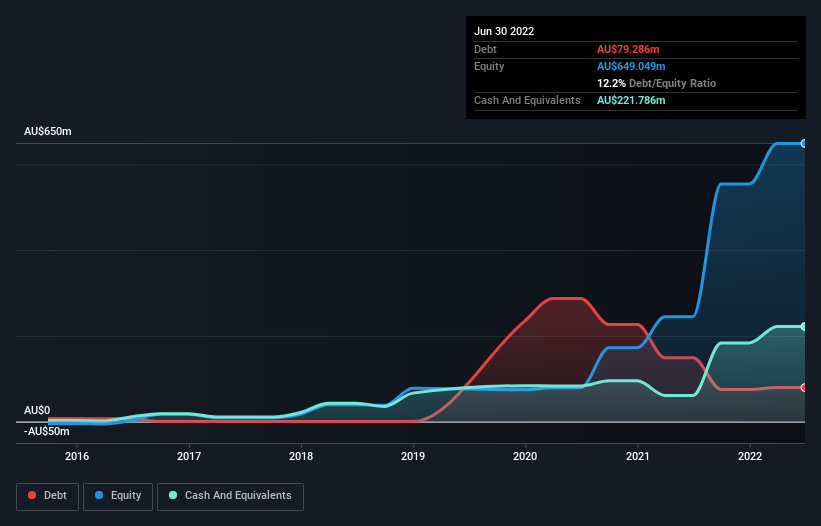West African Resources (ASX:WAF) Seems To Use Debt Quite Sensibly
David Iben put it well when he said, 'Volatility is not a risk we care about. What we care about is avoiding the permanent loss of capital.' So it seems the smart money knows that debt - which is usually involved in bankruptcies - is a very important factor, when you assess how risky a company is. As with many other companies West African Resources Limited (ASX:WAF) makes use of debt. But the real question is whether this debt is making the company risky.
Why Does Debt Bring Risk?
Debt is a tool to help businesses grow, but if a business is incapable of paying off its lenders, then it exists at their mercy. In the worst case scenario, a company can go bankrupt if it cannot pay its creditors. However, a more usual (but still expensive) situation is where a company must dilute shareholders at a cheap share price simply to get debt under control. Having said that, the most common situation is where a company manages its debt reasonably well - and to its own advantage. The first thing to do when considering how much debt a business uses is to look at its cash and debt together.
View our latest analysis for West African Resources
How Much Debt Does West African Resources Carry?
You can click the graphic below for the historical numbers, but it shows that West African Resources had AU$79.3m of debt in June 2022, down from AU$148.7m, one year before. However, it does have AU$221.8m in cash offsetting this, leading to net cash of AU$142.5m.
How Strong Is West African Resources' Balance Sheet?
We can see from the most recent balance sheet that West African Resources had liabilities of AU$153.6m falling due within a year, and liabilities of AU$56.7m due beyond that. On the other hand, it had cash of AU$221.8m and AU$31.9m worth of receivables due within a year. So it actually has AU$43.4m more liquid assets than total liabilities.
This surplus suggests that West African Resources has a conservative balance sheet, and could probably eliminate its debt without much difficulty. Simply put, the fact that West African Resources has more cash than debt is arguably a good indication that it can manage its debt safely.
On top of that, West African Resources grew its EBIT by 57% over the last twelve months, and that growth will make it easier to handle its debt. There's no doubt that we learn most about debt from the balance sheet. But it is future earnings, more than anything, that will determine West African Resources's ability to maintain a healthy balance sheet going forward. So if you're focused on the future you can check out this free report showing analyst profit forecasts.
Finally, while the tax-man may adore accounting profits, lenders only accept cold hard cash. West African Resources may have net cash on the balance sheet, but it is still interesting to look at how well the business converts its earnings before interest and tax (EBIT) to free cash flow, because that will influence both its need for, and its capacity to manage debt. Looking at the most recent three years, West African Resources recorded free cash flow of 28% of its EBIT, which is weaker than we'd expect. That's not great, when it comes to paying down debt.
Summing Up
While it is always sensible to investigate a company's debt, in this case West African Resources has AU$142.5m in net cash and a decent-looking balance sheet. And we liked the look of last year's 57% year-on-year EBIT growth. So is West African Resources's debt a risk? It doesn't seem so to us. When analysing debt levels, the balance sheet is the obvious place to start. But ultimately, every company can contain risks that exist outside of the balance sheet. To that end, you should be aware of the 1 warning sign we've spotted with West African Resources .
If, after all that, you're more interested in a fast growing company with a rock-solid balance sheet, then check out our list of net cash growth stocks without delay.
Have feedback on this article? Concerned about the content? Get in touch with us directly. Alternatively, email editorial-team (at) simplywallst.com.
This article by Simply Wall St is general in nature. We provide commentary based on historical data and analyst forecasts only using an unbiased methodology and our articles are not intended to be financial advice. It does not constitute a recommendation to buy or sell any stock, and does not take account of your objectives, or your financial situation. We aim to bring you long-term focused analysis driven by fundamental data. Note that our analysis may not factor in the latest price-sensitive company announcements or qualitative material. Simply Wall St has no position in any stocks mentioned.
Join A Paid User Research Session
You’ll receive a US$30 Amazon Gift card for 1 hour of your time while helping us build better investing tools for the individual investors like yourself. Sign up here

